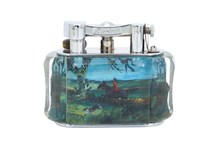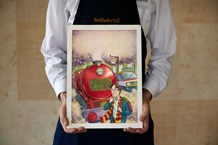ANTHONY Allen – “Tony to his friends” – described on the flyleaf as New Zealand’s largest Asian antiques dealer, is the author of Allen on Fraud, Allen’s Introduction to Later Chinese Porcelain and Allen’s Authentication of Later Chinese Porcelain.
Mr Allen would appear to have no problems with himself. In the book’s preface he tells us that his background is forensic accounting, notably fraud investigations, and that his antiques business is primarily in smuggled Chinese ceramics and bronzes which are prohibited exports from China, and which he buys legally in Hong Kong.
Mr Allen’s dealing activities on the Internet have apparently caused him to run foul of all manner of academics, historians, palaeontologists and archaeologists, all of whom believe that the artefacts he deals in, from dinosaur eggs to bronze vessels, should remain in the ground untouched until a future generation can study them. Hard cash, of course, doesn’t come into it. Mr Allen’s introduction discourses on some fake swords and their incompetent laboratory testing, and he has a bit of rant on the lines of “...he also ripped me off to the tune of $140,000 in false and unsubstantiated freight charges”, and “...I thought I had escaped
the clutches of this charlatan,” etc.
That’s the trouble with self-publishing, not enough of the red pen.
However, with its 250 colour pictures, the 15 chapters include an introduction of Chinese bronze casting techniques of the Shang to Han dynasties, an outline of authentication techniques generally, with brief sections on the use and practicality of metallurgical, X-ray, thermoluminescence, carbon 14, high power microscopy and digital scanning. There is a chapter on visual considerations in authentication. Chapter 13 offers a catalogue of affordable bronzes while chapter 14 discusses fakes. Mr Allen tells us that the most frequently asked question from his customers is: “How do I know such and such a bronze is genuine? and that he sometimes replies: “How does one balance on a bicycle?” It’s in there somewhere if you know where to look.
In Chapter I: A Cautionary Digression, under sub-head 1.4 Dishonesty, Mr Allen comments that the field of ancient Chinese bronzes is an area for extreme caution, largely as a result of the inherent dishonesty of native Chinese bronze casters and dealers. He issues a warning to novice Chinese bronze collectors to be alert to the Chinese practice of cheating. He says: “It is not a new practice, but extends back thousands of years, and at the risk of attracting the asinine attention of the Race Relations Office, I suspect that it is as accepted with them as perhaps rice and vegetables is with dinner.” Just a hint of phobia, maybe Mr Allen?
Authenticity in focus
Allen’s Authentication of Ancient Chinese Bronzes, by Anthony J. Allen, published by Allen’s Enterprises Ltd of Takapuna, Auckland, New Zealand, www.allens.antiques.com and distributed in the UK by David Aldous-Cook: Reference Books on Antiques, Sutton, Surrey. Tel/fax: 0208 642 4842. ISBN 0473080451 £60hb




